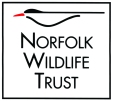
Wildlife Trust guest blog: Make June a wild time for children

Norfolk Wildlife Trust Reserves Officer, Robert Morgan has kindly written the following blog with some great family inspiration for the 30 Days Wild challenge.
A five year old let loose in a garden will find the oddest insect or daintiest little flower and will point or hold it up ‘look! what is it?’
Instinctively children have an attachment to, and interest in, plants and animals. They are subconsciously tuning in on our primeval past, when a knowledge of wildlife, its movements, growth and seasonality was essential for survival. It was the attainment of skills and understanding gleaned in these early years of childhood that enabled them to grow up safe and healthy.
Often it is unsubtly suggested to children that the ‘outside’ is somehow dirty and wild-things are not to be touched; unhindered a child will pick up a worm or prod a frog without worry. Of course, there are poisonous berries and venomous snakes to be avoided, and our prehistoric ancestors would have passed this on through wisdom rather than fear. But, as adults, we seem to have lost touch with nature and the wonder of discovery that children feel, maybe as a result of being constantly told ‘yuck, put it down’.
Norfolk Wildlife Trust works to connect children (and their adults) with wildlife, and we have joined with other county wildlife trusts to ask people to do something wild each day in June.

The ‘30 Days Wild’ is a challenge to carry out a daily random act of wildness, however great, small or obscure and you can take part as an individual, family or organisation.
Not only is it a great challenge for your children during the current restrictions, but an opportunity for you to invigorate your senses; to smell, breathe and feel again. Many studies show that everyone benefits, of whatever age, by spending time regularly amongst nature. It improves one’s health, happiness and promotes positive behaviours.
So, for a short while each day in June why not switch off the computer, television or iPad and tune in to bird-song, butterflies and daisies instead. Or even just create space in a green place for a quiet reflective moment.
You can apply for a free 30 Days Wild digital pack (containing ideas, wild bingo card, wild calendar and a nature table collection) at wildlifetrusts.org/30dayswild.
Despite the current lockdown it has never been the case that you have to travel vast distances to delight in nature’s wonders – even the smallest garden has a surprising array of creatures and plants. Otherwise the local park, verge of a country lane or town centre cemetery are good alternatives.

Here are some Random Acts of Wildlife suggestions to get you started:
- Walk bare foot across your lawn, particularly during a cool dewy morning.
- Lie on your back and watch the clouds sail by for 30 minutes.
- Get up early, stand outside and listen to the dawn chorus.
- Watch a sunset and look for bats flying around the garden at dusk.
- Even in the heart of cities, see and hear screaming swifts.
- Sleep outside under the stars.
- Plant wildflower seeds in your lawn and allow time for them to grow.
- Quietly sit by a pond or in a corner of the garden, with no concern for time.
- On a clear night sit and marvel at the stars.
- Follow a bumble bee around the garden.
- Create a piece of art from natural items such as leaves or feathers.
- And yes, hug a big old tree – it’s surprisingly pleasant.
Many child development experts speak extensively about the ‘extinction of experience’ particularly relating to the natural world. Studies show that children that spend time in green spaces often view nature as magical and they develop a protective attitude to the environment. It has also been shown that children that lacked stimulation through contact with nature grow to see it as irrelevant in adulthood, even viewing wild places as hostile.
I believe a desire for us to live on a clean green planet is discovered, fundamentally, through nature play in childhood. Although stopping the decline of our natural world is clearly our generation’s job, turning it around is ultimately the next. The need to engage children through education is important but enchanting them through the mystery and wonder of nature is vital. Let’s make the 30 days of June ‘wild’ for ourselves and most importantly our children.
 Robert Morgan, Norfolk Wildlife Trust Reserves Officer
Robert Morgan, Norfolk Wildlife Trust Reserves Officer
